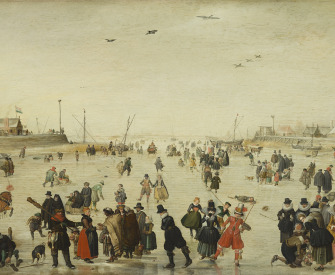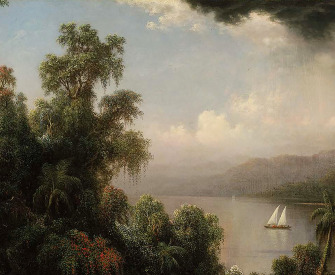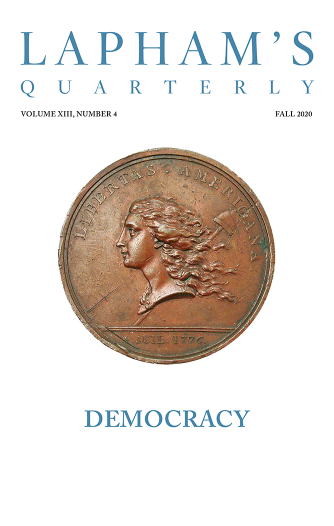Never has any people since the fall of Carthage been at the same time powerful by sea and land till Venice set the example.
The Portuguese, from their good fortune in discovering the passage by way of the Cape of Good Hope, have been for some time great lords on the coasts of the East Indies but have never been very respectable in Europe. Even the United Provinces became warlike contrary to their natural disposition and in spite of themselves; and it can in no way be ascribed to their union among themselves, but to their being united with England, that they have contributed to hold the balance in Europe at the beginning of the eighteenth century.
Carthage, Venice, and Amsterdam were undoubtedly powerful, but their conduct has been exactly like that of merchants grown rich by traffic who afterward purchase lands with the dignity of lordship annexed to them. Neither Carthage, Venice, nor Holland have, from a warlike and even conquering beginning, ended in a commercial nation. The English are the only people existing who have done this; they were a long time warriors before they learned to cast accounts. They were entirely ignorant of numbers when they won the battles of Agincourt, Crécy, and Poitiers, and were also ignorant that it was in their power to become corn factors and woolen drapers, two things that would certainly turn to much better account. This science alone has rendered the nation at once populous, wealthy, and powerful. London was a poor country town when Edward III conquered half of France; and it is wholly owing to this that the English have become merchants, that London exceeds Paris in extent and number of inhabitants, that they are able to equip and man two hundred sail of ships of war and keep the kings who are their allies in pay. The Scottish are born warriors and, from the purity of their air, inherit good sense. Whence comes it then that Scotland, under the name of a union, has become a province of England? It is because Scotland has scarcely any other commodity than coal, and that England has fine tin, excellent wool, and abounds in corn, manufactures, and trading companies.
When Louis XIV made Italy tremble, and his armies, already in possession of Savoy and Piedmont, were on the point of reducing Turin, Prince Eugene was obliged to march from the remotest parts of Germany to the assistance of the Duke of Savoy. He was in want of money, without which cities can neither be taken nor defended. He had recourse to the English merchants. In half an hour’s time they lent him five millions, with which he effected the deliverance of Turin, beat the French, and wrote this short note to those who had lent him the money: “Gentlemen, I have received your money, and flatter myself I have employed it to your satisfaction.” This gives an Englishman a kind of pride, which is extremely well-founded, and causes him, not without reason, to compare himself to a citizen of Rome. Thus the younger son of a peer of the realm is not above traffic. Lord Townshend, secretary of state, has a brother who is satisfied with being a merchant in the city. At the time when Lord Oxford ruled all England, his younger brother was a factor at Aleppo, whence he could never be prevailed on to return, and where he died. This custom, which is now unhappily dying out, appears monstrous to a German, whose head is full of the coats of arms and pageants of his family. They can never conceive how it is possible that the son of an English peer should be no more than a rich and powerful citizen, while in Germany they are all princes. I have known more than thirty highnesses of the same name, whose whole fortunes and estate put together amounted to a few coats of arms and the starving pride they inherited from their ancestors.
In France everybody is a marquis; and a man just come from the obscurity of some remote province, with money in his pocket and a name that ends with an ac or an ille, may give himself airs and usurp such phrases as “A man of my quality and rank” and hold merchants in the most sovereign contempt. The merchant again, by dint of hearing his profession despised on all occasions, at last is fool enough to blush at his condition. I will not, however, take upon me to say which is the most useful to his country, and which of the two ought to have the preference: the powdered lord, who knows to a minute when the king rises or goes to bed, perhaps to stool, and who gives himself airs of importance in playing the part of a slave in the antechamber of some minister; or the merchant, who enriches his country, and from his countinghouse sends his orders into Surat or Cairo, thereby contributing to the happiness and convenience of human nature.
From Letters Concerning the English Nation. Better known by his pen name, which he adopted in 1718 after an imprisonment in the Bastille, François-Marie Arouet was a defining philosopher of the Enlightenment. In 2011 a junior trade minister in France was asked at a book fair to name the work that influenced him most. “Without doubt,” he replied, “Zadig et Voltaire,” confusing the author of Candide with a trendy clothing store. He later responded to the gaffe on social media: “I love Zadig, I love Voltaire, and I love Twitter. Thank you for this good time!”
Back to Issue



